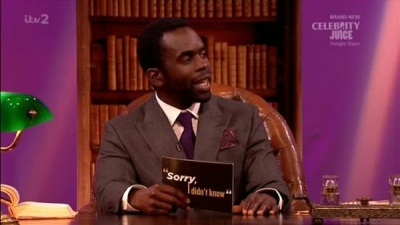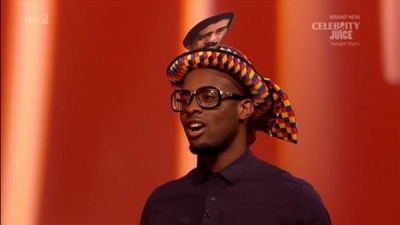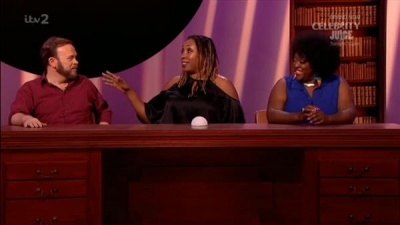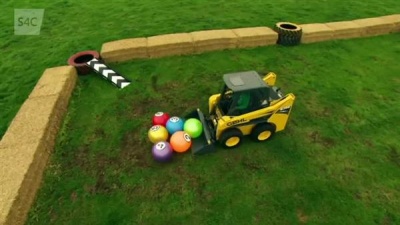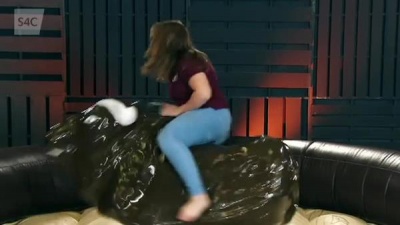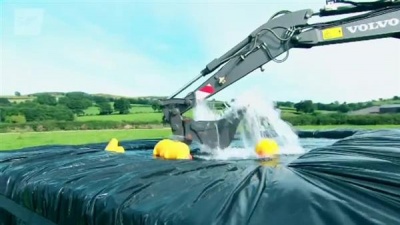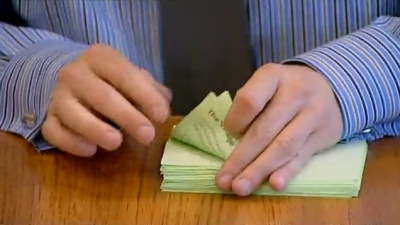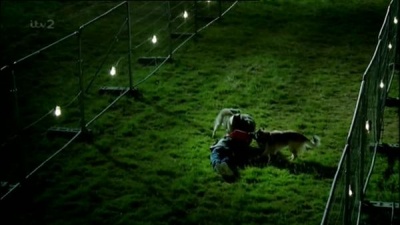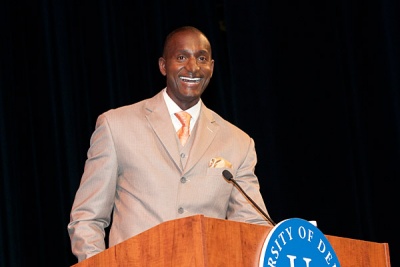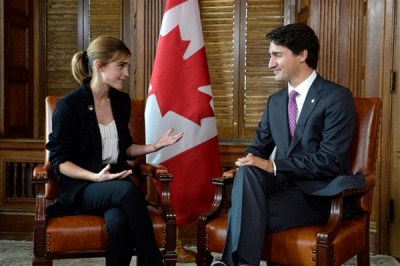Weaver's Week 2016-11-20
Last week | Weaver's Week Index | Next week
Something of a scrapbook this week, as we cover a few disparate items.
Contents |
Sorry, I Didn't Know
Triforce Productions for ITV2, 3 November
To promote the Music of Black Origin awards, ITV2 aired a short series of programmes by black people. One of them was a panel game, concentrating on what black people have done in history.
Jimmy Akingbola hosted the show. When did we last review a new game show hosted by someone wearing a smart suit? Or sat behind a desk with inkwell and lap? Or sat in front of a case full of books? Must be years since we've seen anyone so smart. Even celebrity lookalike Sue Perkins didn't bother with a tie.
Chizzy Akudolu and Jo Martin were the captains, with Paul Chowdhry, Jimmy James Jones, Judi Love, Toby Williams on the panels. We knew none of these faces at the start of the show.
It is a contest, they do ask questions. First round was "What's Your Game?" Here are some faces from history; points if you know who they are and what they did.
Straight away, we can see that this show has got attitude, and it's got comedy. The first face is Ira Aldridge, and he prompts a brief discussion about playing Othello in Shakespeare. Is it a role that only black people can play? Conversely, is it the only role that black people can play? The discussion isn't deep, it's not a debate so much as a run of one-liners, but we can tell the panel knew what they were talking about. The wit and humour hid a cogent and informative chat on the topic.
Then came The World Wide Web of Lies. Each panellist reads out a "fact" – a short story, a little anecdote. The other team is to determine whether it's a fact, or something made up down the pub at lunchtime yesterday.
After the break, they play "Who's On the Hat", yes-no questions against the clock to work out who is on your hat. And there's the inevitable buzzer round to ramp up the tension for the last few minutes. Points, winner, closing credits.
There's nothing at all new in this format, but it's carried by the skill of the panel. The show passed the six-laugh test with flying colours, everyone had something to say. It went at the right pace: fast enough to remain funny, fast enough to keep our attention throughout, just slow enough that we could reflect on the jokes and appreciate them a little more.
Sorry, I Didn't Know told us something about being black. Not just the running joke about aviators being pulled over at 20,000 feet, but the cultural touchstones. The heroes who aren't so famous amongst the white population.
They reflected on the difference between black and Asian – mayor of London Sadiq Kahn is not black – and how "black, Asian, minority ethnic" lumps disparate groups into one pot. So that whites can feel good about themselves? That's our takeaway of the subtext, we might be projecting onto the show.
Ultimately, it was a very entertaining show. We can compare against the BBC's recent history panel show Insert Name Here, and we vastly preferred this one.
We learned more from Sorry: the players made an effort to answer the questions in front of them; over on the Beeb, the teams seemed to delight in avoiding the topic and telling their prepared anecdotes. Most important of all, Sorry, I Didn't Know entertained us, Insert Name Here tended to the boring.
We'd love to see a full series of Sorry I Didn't Know, and we hope ITV2 has the gallus to make it.
Also in the "ITV2 Fresh" season were two comedy pilots. We missed family sitcom All About the McKenzies but saw Dropperz. The tale of a struggling grime group could develop into an intriguing story, but equally might fall flat on its face. What's the Facts? was a mockumentary, a load of cobblers shot in the style of real news. A bit too eager to make obvious jokes; at the most generous, we might see an occasional one-off.
Fferm Ffactor
Cwmni Da for S4C, from 15 October
Since we reviewed the series in 2013, it's evolved into something else.
S4C's farming contest gained teams last year, and has moved to Saturday night this year. The tasks are selected as much for their entertainment value as for their farming excellence.
For instance, the series opened with teams playing pool with beach balls and a tractor. Yes, it demonstrates that they can handle tractors, and use the various implements to work with fragile objects. And it looks great on screen. Zapping around when The X Factor gets dull, viewers may chance upon this bizarre spectacle.
There's a more traditional task, such as shearing a sheep. Will the fleece come off without tearing? Woll Lady Baa-baa gambol off? Done well, a shearing is a work of art; done badly, it's comedy.
Then an engineering challenge, in the style of Scrapheap Challenge. Construct a gadget from bits and pieces, to fill a task. Best performance in the test wins points, but there are also points for the quality of teamwork.
Each show ends with the teams riding a rodeo bull while answering general knowledge questions. Points for each right answer, but a wrong answer will speed up the bull.
Six teams took part this year, split into groups "A" and "B". Each team played each other team in their group, and the top two in each group progress to the crossover semi-finals. It means most teams will progress, we can see people and get to know them a bit better.
When they were finding a single winner, the show had a certain darkness, each week was about finding a loser more than the series was finding an overall winner. The move to teams, the move to Saturdays has changed all that. It's a brighter and lighter show, laughing with the farming community of Wales.
They're never laughing at the farmers. The culture is treated robustly, but always with respect. Entertainment is at the little incompetences, about the burst beach balls, about the sheer implausibility of a young farmer answering trivia questions while riding a rodeo bull.
Edition one of Fferm Ffactor aired at the same time as mass entertainment show Schlag den Star on Prosieben. Many of the challenges on Fferm Ffactor could be done in Köln.
We Need To Talk About The Apprentice
This column has a rule of thumb: that game shows reflect society, not the other way round. It's a rule of thumb, it encourages us to be sceptical when someone claims "Oh, this is a reaction to such-and-such on telly." Sometimes, the rule of thumb will be false. We can find this out through evidence.
Because UKGameshows.com is a worldwide site, it's likely that we have some readers who voted in the states and territories. If you're one of them, and take offence at people disagreeing with you, you might wish to skip past this piece.
This column doesn't understand your personal situation better than you. We're going to discuss sexism, racism, and things like that. If that kind of thing is likely to upset you, you might wish to skip this piece.
Be aware that this piece is Eurosplaining. It's coming from the right-hand side of the Atlantic. We're not a direct part of the culture we're describing, we're relying on reported sources and other thinkers.
And be aware that it's preachy. Literally.
A few months ago, we looked into a causal question: did Have I Got News for You cause Brexit? We don't believe it did, there were so many other factors at play. And even if it did, the fault did not lie with Angus Deayton.
Last week, there was a vote to advise the electoral college of the United States when it meets in December. The advice was they should elect a violent, white supremacist, misogynist, xenophobic, racist-backed, sexually predatory, unstable, dangerously unqualified, self-mythologising demagogue.
Many of these facts are beyond the scope of this column. We are, after all, a game shows site. We don't rule the world. But one aspect of this fiasco does cross our plate.
This week, we need to ask a familiar question: did The Apprentice influence this advisory vote?
Let us roll back the years, to the Week's review of The Apprentice in March 2005.
- The Apprentice was devised for an audience in the spiritual home of extreme capitalism, and eagle-eyed viewers will have seen that version play out in the teatime slot on BBC2 last autumn. We gave up there after about twenty minutes, as we were bored rigid of the way the main cheese used the show to promote himself, his ventures, his companies, himself, his leasing agents, his subsidiaries, and most of all himself.
In retrospect, two points spring to mind.
- You think Eggheads is the worst show to go out on BBC2 at 6pm? You are wrong! You are wronger than Wrongo Ron McWrongoson of Wrongsville.
- Even in the first twenty minutes, we could see The Apprentice (NBC) is about one thing, and it ain't the contestants.
We gave the BBC production three episodes to prove itself. Our conclusion: it's not worth the candle. We haven't watched an episode since. And we're OK with that, the BBC has to appeal to everyone, and enough people like The Apprentice to make it one of those shows other people watch and enjoy.
So long as it doesn't harm anyone, let it roll. But it's now clear The Apprentice is harming people.
All about the money
The head honcho on The Apprentice doesn't actually do anything useful. He sits in a big office, shouts at people, tells them what to do. He doesn't deign to go into the real world, he has underlings for that. All he does is dish out favours to people who please him, and curtly dismiss anyone he dislikes.
The boss character surrounds himself with yes-men and acolytes. They know he's quick to anger and believes his word to be law.
In the world of The Apprentice, the "people who please him" are exactly the people who make the most money. Profit is rewarded, ethics are not. That's what the contestants do. All of them. They talk like the big cheese, hoping to ingratiate himself with him. They bend their own personal ethics in pursuit of profit, in pursuit of the boss's temporary favour.
And the viewers watch this. All of this baloney is normalised. Week after week, viewers see the boss, and believe the lies he tells about himself. They're to believe the boss has any insight into character.
The boss portrays himself as the American Dream made flesh. Viewers are meant to believe the boss has values, and that those are values they can aspire to. After all, he's successful, and if the plebs emulate the boss's values, maybe they'll be as rich as he is.
Of course, anyone who's been paying attention in the real world will know that the boss got where he is by a massive inheritance. There are no short-cuts to success. Everyone else wants to be rich, everyone else knows we need to work our socks off to get rich. But some are born into wealth, and exploit the rest of us to preserve their elite position.
The boss maintained his position by cheating. He doesn't pay suppliers, he declares himself bankrupt at the slightest provocation. He doesn't pay taxes, and we don't actually have proof that he's an American citizen.
His way isn't the American Dream made flesh. It's cheating, it's elitist, it's him profiting from people who actually do an honest day's work.
But these inconvenient truths are waved away on The Apprentice. Who cares about facts, they don't matter when you've got good editors. And The Apprentice had good editors. They could identify the villain of the week at a thousand paces, and edit them to suit the narrative the producers wanted. And they would be nice to the rich man, not only because they wanted to keep their job but also because he – literally – ran the show.
Keep your hands to yourself
The Apprentice contained many examples of what not to do in business. The show was racist, the show was misogynistic. Outside the television studio, it's not true that "profit permits you to say and do racist and sexist things."
Outside the television studio, anyone claiming that "women are intellectually inferior" would be contradicted by example. Outside the television studio, anyone who said that "women of colour are angry, irrational, lazy" would be contradicted by example.
But all these things were said and done by the person doing the firing. Being discriminatory, having no shame about sexist and racist things, that came across as "honest". Worse, discrimination was framed as necessary to making a big profit. Remember, The Apprentice is not about "doing business well", it's about "making a profit".
Of course, anyone who's been paying attention in the real world will know that the boss got where he is by cheating. He literally built his fortune on discrimination. In the 1970s, he refused to let out houses to black people. He was prosecuted, because this discrimination is illegal as well as being immoral. But he escaped conviction by promising to do better next time. He didn't.
His way isn't the honest American dream. It's cheating, it's him cutting in front of people who actually do an honourable day's work.
The Apprentice made it normal to be racist. The Apprentice made it normal to be sexist. Behind the scenes, there are credible claims that the boss brought his little hands into places they weren't invited. Feeling up and groping women, which is still a crime in all civilised jurisdictions. He's told us that he did that while filming other shows, and rumours are that there could be some incriminating film footage.
But we've not been permitted to see the film. Mark Burnett, who invented The Apprentice, is a close personal friend of the white trash boss. He has the resource to make sure anyone who leaks footage may never work again.
And it seems that Burnett doesn't learn from his mistakes – with the old boss concentrating on something else, Burnett appointed Arnold Schwarzenegger, who once groped a presenter live on Channel 4.
Race apart
Series four winner Randal Pinkett said part of his Apprentice-winning interview was questions about which contestants he might sleep with. Women contestants were described as "the really hot one" and "the one with the big chest"; men were "the man from Princeton" or "him from LSU".
Pinkett told The Hollywood Reporter how the bigoted cheese treated him differently because he's black. "After he declared me the winner and said, 'Randal, you're hired,' he asked me a question that he had never asked any contestant prior and never asked of any contestant after me. He asked me if I wanted to share a title with the white runner-up," he recalls. "The better question is: Why did he ask me to share? And my only answer is that he did not want to have an African-American have a clear, clean, full victory."
Pinkett's prize was to work in the boss's company for a year in 2006. "There were no executives of color in the organization," he told The Hollywood Reporter. "I never sat in a room with another person of color over my entire year there other than the person I saw in the mirror."
No other black person won The Apprentice on NBC.
We could go on. We could mention the fabricated "row" with Rosie O'Donnell. Or the nepotism of employing the prince and princess. Or the charity "donations" made on air. These proved to be candyfloss, they never existed.
Why this column is ignoring The Apprentice on the BBC
One thing is clear. The boss on NBC's The Apprentice lacks humility. He doesn't show compassion. He's grasping and he exploits honest people. He doesn't represent decent, hardworking, honest Americans.
Over ten years, The Apprentice drummed home its message. Its boss character repeated and repeated and repeated his points. He surrounded himself with unthinking acolytes, such as Piers "Wow!" Morgan. There were no business lessons, just lessons in how to ruin lives and be a complete blighter.
In this column's view, The Apprentice is a tainted show. It will always be associated with its false entertainer, giving a deviant and impotent demagogue power beyond his abilities.
We know how The Apprentice on the BBC is a success. It's co-owned by the people who made NBC's edition, and this column believes the NBC team have made gross errors of judgement. The damage to our credibility from ignoring the show is something this column can live with; the damage to society from ignoring sins seen on The Apprentice is not something we can endure.
The current series has been filmed, the BBC may as well finish it. We will think much worse of the BBC if it commissions another series. We will think worse of Alan Sugar – who is guilty of none of the crimes or moral failings we've discussed – if he takes part in another series.
And we see absolutely no way the BBC can show any more editions of Yankee Apprentice. Remember, Top of the Pops repeats get taken off for less. And all of its presenters did a lot for charity.
Closing thoughts
An inexperienced, thin-skinned demagogue is close to a very powerful office. Political victories create atmospheres, and we have every reason to be fearful of the forces he will unleash.
Here's a very, very small example. The boss is going to appoint the new head of an agency. The agency owns land. The land is leased out to a hotel. The hotel is owned by the boss. This is how the elite keep their position: they pay themselves massive amounts, and they take that money from hard-working decent people.
Beyond this corruption, there is bigotry and boorishness. There is misogyny, there is racism, there are plans straight out of fascist history.
Gross and immoral behaviour, by repetition, has come to seem "normal". Whether they intended to do this or not, people behind The Apprentice helped to make this happen. We cannot stand by and ignore this fact.
Everyone associated with his rise needs to take stock of what they have done. Everyone associated with his rise – including we in the game show community – needs to reflect on how this happened. We need to consider our next steps, and then act with purpose.
When the levers of power are seized by the small hands of hateful men, we need to stand with the most vulnerable, and we don't give up until it's morning again. We have work to do.
This Week and Next
Ant and Dec have signed another deal with ITV. The stars will continue to host Saturday Night Takeaway, Britain's Got Talent, and I'm a Celebrity... Get Me Out of Here! for the next three years.
ITV have also told us about the judges for their latest and wholly original talent show, BBC The Voice of These Islands Kids. Pixie Lott and Danny Jones join will.i.am on the pop panel. Pixie and Danny have had similar careers: pop stardom (Danny with McFly) followed by a turn on Strictly Come Dancing, and most recently stage work.
Emma Willis hosts the main show, and Cel Spellman fronts the spin-off for ITV2. This cheered us up: Cel is an excellent host, and could easily host the main programme if needed.
Also from ITV, Dance Dance Dance allows celebrities to recreate iconic dance routines. Alesha Dixon and Will Best host the programme. ITV's description doesn't make it clear whether this will be a competition like Let's Dance for Comic Relief, or just an entertainment.
University Challenge pitted St Andrews against Birmingham. It contained a Hidden Transmission Indicator, a set of questions on 5 November, which would have been two days ago had Autumnwatch not got in the way. Birmingham won by 195-115, pulling ahead in the final minutes.
So, what was the mistake in this week's Only Connect? Victoria told us there would be one, and we didn't have long to wait. "In the words of Sooty..."
The actual error was in the Limehouse Four, who founded the SDP. David Owen, Bill Rogers, Shirley Williams – and David Steel who had been in the Liberal party for some decades. How quickly they forget prime minister designate Roy Jenkins. OC also had a Hidden Transmission Indicator, on "secret" codenames for presidents.
This week's game was between the Networkers and the Psmiths, and was a low-scoring match. 6-4 after the first two rounds, 16-14 after some easy walls, and 22-19 – the Psmiths were never behind.
Hive Minds reached the semi-finals, Ortographobes and Prime faced off. A high-scoring opening – 12-11 to Prime after the first round, and some nasty tricks in the hives. Nepal and Burma cropped up in one about Asian geography, but neither had a valid partner.
19-14 after the second round – Prime took their advantage to pick their best topic, and found all three hill ranges. In the Superhives, American poets proved too difficult for the Ortographobes – their guess of Berlin won a point, but they somehow conspired to miss Ferlinghetti. Prime had sea battles, and almost mentioned the battle of Taramasalata.
24-16 ahead, and a maximum of 18 points left, Prime needed only a few to win. Not that they picked their questions, once buzzing in on "1995 animated Disney film" before Fiona had even finished the question. Prime actually pulled away to win 34-22.
Mastermind picked a quiet episode, so as not to distract from Children in Need on BBC1. Martin Lloyd won this week. He was amongst equals after the specialist round on the Battle of Trafalgar, and won on the general knowledge section. A winning score of 24 (5 passes) is one of the lowest this year.
The other players were Anne Wray (Operas of Puccini), Peter Bonnell (Bill Shankly), and Sinead Jean (Eastenders).
BARB ratings in the week to 6 November.
- Planet Earth II is the new number one, seen by 12.25m viewers. Strictly was the top game show, 11.45m saw the performances.
- The X Factor Results brought in 6.85m, HIGNFY 5.15m, and Pointless Celebrities 4.9m.
- ITV's Sunday show The Next Great Magician had a respectable 3.45m, and took the edge off Strictly results. The Chase daytime and Tipping Point celebrity are both well over 3m.
- University Challenge (3m), Only Connect (2.8m), The Choir (2.3m), and Strictly on Two (2.05m) all did well on BBC2.
- Top digital show was Celebrity Juice, at 1.495m. Taskmaster on Dave finished with 915,000, and third place is Xtra Factor on ITV2 with 450,000. Top on pay-tv was Masterchef Australia (270,000 on W), ahead of Landscape Artist of the Year (260,000 on Artsworld).
It's performance shows for the next two Weeks: the Junior Eurovision Song Contest (Fun Kids and TG4) next week, and we review The X Factor (ITV and TV3, last night and tonight) on 3 December.
Photo credits: Triforce Productions, Cwmni Da, Studio Lambert, Gogglebox, UDaily, Government of Canada
To have Weaver's Week emailed to you on publication day, receive our exclusive TV roundup of the game shows in the week ahead, and chat to other ukgameshows.com readers, sign up to our Yahoo! Group.


